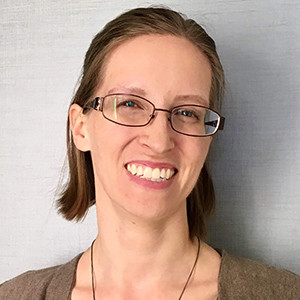
Kathryn Hasz
Professor Kathryn Hasz earned her Ph.D. in materials science and engineering from the University of Pennsylvania and her B.A. in materials physics from Oberlin College. Her graduate work focused on nanoscale friction and adhesion in extreme conditions. Since then, her research interests have grown to include the pathways in which students become interested in engineering. She joined the Carthage faculty in 2022. Prof. Hasz is excited to engage students in hands-on engineering problems both in the classroom and in the lab. Her nanoscale research gets students directly making samples and taking measurements. She is also working on expanding the engineering program while building student and community involvement.
Hear from Prof. Hasz: Why Engineering?
“When I was young, I never imagined myself as an engineer. I loved craft projects, dancing, and anything else that let me tap into my creativity. Whether it was making up stories for my dolls, designing jewelry, or choreographing a piece for my high school dance team, I relished the opportunity to take my imagination and show others what I see.
“Then, during my freshman year of undergraduate study, I started working in a physics lab. All of a sudden, I saw that creativity I loved being used in science. As I progressed through my learning, I realized that engineering was a space in which I could blend my creativity with scientific rigor to build solutions to problems both big and small.
“I see engineering as a space to create on a large scale and use those creations to better the world around us. It taps into the drive to build something new through curiosity, scientific understanding, and some plain old trial-and-error. As a learner and an educator, I try to find opportunities for projects in which there is no one clear best answer but instead a problem that can be approached from many directions, with the inevitable challenges and failure as a part of the learning process.
“I believe engineering must happen in a diverse and supportive environment to be truly successful. Without various perspectives and backgrounds, we miss important problems and possible solutions from experiences that differ from our own. Without support, we lose the confidence to try something radical and risk failure.
“As a scholar, I have multiple interests. On the scientific side, I am working to understand friction and surface forces at the nanoscale. Currently, there are no nanoscale systems that have sliding parts because the friction causes them to fail too frequently. I work with atomic force microscopy to study the friction and adhesion of a single point sliding along a countersurface. Students working with me will learn how to measure nanoscale forces and surface features, prepare 2D and layered materials, and customize equipment and data acquisition software as we deepen the knowledge pool of nanoscale friction.
“On the educational side, I want to discover more about the factors driving students to or from engineering, especially those from traditionally marginalized groups. I want to make sure students like me, who did not see themselves as engineers, can find a way into it if they so choose. Students can work with me to use informational interviews, surveys, and demographic data to explore how engineers are shaped.
“Outside of work, I still love crafts and dancing. I also like to read and bake. I am regularly modifying recipes in ways that sometimes turn out well and occasionally turn out poorly. But that’s a risk I’m willing to take.”
- Ph.D. — Materials Science and Engineering, University of Pennsylvania
- B.A. — Materials Physics, Oberlin College
- EGR1100 Introduction to Engineering Design
- EGR3100 Materials
- EGR2100 Statics
Nanoscale surface forces, pathways to STEM and engineering

